- Home
- Mike Lupica
Robert B. Parker's Blood Feud Page 4
Robert B. Parker's Blood Feud Read online
Page 4
I was living the dream.
SEVEN
I CALLED RICHIE when I got back home and knew immediately from the thickness of his voice that I had awakened him.
“Not gonna lie,” he said. “Getting shot isn’t for sissies. I told myself I’d just close my eyes for a little while and slept until now.”
“I won’t tell Spike what you said about sissies,” I said. “I think he could take you in a fair fight today.”
“Maybe not just today,” Richie said, “not that I’d ever admit that to him.”
He told me that Danny Kiefer, the detective who’d caught the shooting, had called before he fell asleep to tell him that the whole thing was still clean, no cameras, no bullet, no witnesses. The neighbors who’d heard the shot thought it might be a tire backfiring. Kiefer, Richie said, seemed less interested in Richie getting shot than why he’d gotten shot, and kept bringing the conversation back to the Burke’s family business.
“I told him,” Richie said, “that it has always been my policy to mind my own business.”
“Which,” I said, “is not technically true,” and I reminded him of the meeting he had brokered between his father and Albert Antonioni once.
“Didn’t think that was any of his business,” Richie said.
“Even if you might possibly know something that would help him identify the shooter?”
“I don’t,” Richie said, “even if.”
“Kiefer is a good detective,” I said.
“I know how tough a grader you are when it comes to detectives,” Richie said. “It must mean he’s great.”
“Takes one to know one,” I said.
“My father told me that he had asked you to stay out of this,” Richie said. “But I told him that if you listened to me, we’d still be married.”
I asked if he’d eaten anything, assuming that he had not. He told me he had not.
“Maybe later,” he said.
I told him to check out the menu from Spike’s and text me an order and I’d deliver.
“Are all of the good restaurants closed?” Richie said.
“Would you like me to tell him that you said that?”
Richie said that if I was such a great detective I’d figure it out.
* * *
—
SPIKE AND I sat at a table for two in his back room, at a little after seven. The chef was cooking up veal chops for Richie and me, and chopped salads. Spike insisted on adding two orders of apple pie.
I told him I was dieting. He told me to shut it.
“You lied when you said it was his idea to get takeout from here, didn’t you?” Spike said.
“Absolutely not.”
He raised an eyebrow. Not everyone could carry that off. Spike could.
“More likely,” Spike said, “he made some kind of snippy remark about the cuisine at what Boston magazine recently called the hottest restaurant in the entire Quincy Market area.”
“For me to say anything more would be a violation of client privilege,” I said.
“So he did make a snippy remark.”
“Totally.”
Spike was wearing what I was sure was a Brioni suit that might have cost more than my car, with an open-necked white shirt. All in all, he looked good enough to take the big town for a whirl. Spike wasn’t handsome in any sort of classic way. But the sum of him, the combination of looks and fun and physicality and danger, is what did make him attractive to men and to women.
No woman more than me.
“So he is a client,” Spike said.
He made no attempt to make it sound like a question. Just a simple declarative sentence. A statement of fact.
“In theory,” I said. “Just without any money changing hands.”
“There is more than one way for him to pay you,” Spike said, and raised the eyebrow again.
“Don’t be coarse.”
We each sipped some Whispering Angel, my favorite rosé and Spike’s, too, as much for the name as for the taste.
“Play this out,” Spike said. “Say this is some bill being presented to Desmond Burke because of something he did in the past. And say Richie is only the first in the family this guy’s going to come after. What makes you think he won’t come after you, too?”
“I can take care of myself.”
“To a point, girlie. But if they can hit Richie they can hit you.”
“I am ever vigilant.”
“But when you start poking around, you will eventually annoy this guy, or whomever sent him, if somebody sent him.”
“That will involve finding out who the guy is, or the whomever.”
“Sins of the father,” Spike said. “I mean, what the fuck?”
“Excellent point.”
“I’m not just eye candy,” Spike said.
“It’s amazing how often I manage to forget that,” I said.
One of the waitresses had stopped by the table to tell us that the food was being bagged up. Spike and I talked a bit more about Desmond Burke. He asked how much I really knew about his past. Most of it, I said, had come from Richie, who I knew had never told me as much as he knew. As complicated as my relationship with his father had always been, I knew that theirs was far more complicated than I would ever possibly know. As much as Richie Burke was his own man and had forged his own path in life, with me and the saloon business and everything else, he was still Desmond Burke’s son.
“You have to be aware that the detecting in this case is going to be more about Richie’s father than anything else,” Spike said.
“Profoundly aware,” I said.
“And that you will likely uncover inconvenient truths,” Spike said.
“And not Al Gore’s,” I said.
“I’m being serious,” Spike said.
“I know,” I said.
“Richie may have spent a lot of his life compartmentalizing,” Spike said. “You’re not going to have that luxury.”
“Aware of that, too.”
“He’s a fucking gangster,” Spike said, “no matter what kind of manners he has. And will most likely not want you poking around in his affairs, even if it means finding out who shot his son.”
I sipped more wine.
“The irony,” I said to Spike, “is that Richie had been telling me that his father and Felix and Peter, the youngest brother, have basically been downsizing the past couple years, mostly because they’re so goddamn old and so goddamn tired. He said that he’d heard his father say more than once that he had come to find the illegal gun trade as distasteful as he’d always found drugs.”
“Hasn’t made him quit it, from what I hear,” Spike said.
I felt as if I raised a pretty saucy eyebrow of my own.
“I know people,” Spike said. “Who know people.”
“Forgot.”
“And probably forgot that one of the biggest gangsters in town was gayer than Greenwich Village.”
“Gino Fish.”
He nodded.
“I’ve always wanted to ask you,” I said. “You never hit that, did you?”
“Don’t be coarse,” Spike said.
EIGHT
FOR THE PAST six months Richie had been living in an apartment on Salem Street in the North End.
He hadn’t stayed in one place for very long since our divorce, and had even moved once while still married to Kathryn. After they divorced, she kept their town house in Brookline and Richie had moved to Salem Street, at least partly to be closer to the saloon. The apartment was meticulously neat and sparsely furnished, and so fit him completely. The only photographs were of me and the two Rosies. There was one ancient black-and-white of his late mother, Theresa Clancy Burke.
There was a large living room, a large master bedroom, a smaller bedroom that served as Richie�
�s office. When I’d arrived I’d seen a car parked across the street, and knew that at least two of Desmond Burke’s men were inside.
I didn’t think anyone would make a move on Richie here, or ever again, for that matter. But Desmond Burke hadn’t survived as long as he had in the world he inhabited without being an extremely careful man.
Richie didn’t eat much of the food Spike had sent over, saying he wasn’t as hungry as he’d originally thought. As much as he said he’d slept across the day, he still looked and sounded tired.
“Tell Spike thanks, though,” he said. “And that the food didn’t suck.”
“A review like that will probably make him want to kiss you,” I said.
“Then maybe you better tell him that I thought it did suck,” Richie said. “Can’t take any chances.”
We were sipping a pinot noir from Willamette Valley that he’d requested. I’d asked if that was wise, given the pain meds he was taking. Richie said that if I wouldn’t squeal to the doctors, he was willing to risk it.
He was wearing a plain gray pocketed T-shirt and faded jeans, and was barefoot. There was more beard to him than usual, which meant he hadn’t seen fit to shave a second time today. We were next to each other on a couch I’d helped him pick out when he’d moved in. There was a Red Sox game, muted, on the big screen mounted on the wall across from us. I think he had the game on only for his own twisted amusement. We had many things in common, but he knew that baseball wasn’t one of them. He just didn’t think my indifference toward baseball was sick and depraved as Spike did.
“I think we can agree,” Richie said, “that it was a shot that might of gone through me but was intended to go across my father’s bow.”
“We can,” I said. “We think so, your family thinks so, Spike thinks so, as do the cops.”
He grinned.
“You and Dad,” he said, “chopping it up at Durty Nelly’s. Would you mind terribly if I asked you to live-stream it next time?”
“I know I probably set a low bar where he’s concerned,” I said, “but it wasn’t as awkward as I thought it might be.”
“He never showed it very much,” Richie said, “but he was always quite fond of you, even if you are Phil Randall’s kid.”
“I was looking through our wedding album before I went to Spike’s,” I said. “In the few pictures your father and my father were in together, they each looked like somebody had just pulled a knife on the two of them.”
“I don’t believe they’ve spoken since,” Richie said.
“Oddly enough,” I said, “they might be able to help each other on this.”
“Might, but won’t,” he said. “The last person my father wants involved is you. Second-to-last would be Phil.”
“Your father,” I said, “has to understand that this isn’t just about him, or what he wants.”
“Why don’t you tell him that?” Richie said.
He leaned forward, grimacing slightly, and reached for the bottle on the coffee table and poured each of us more wine. As he did, I looked past him and saw the painting of mine on the wall behind us, a sailboat in Boston Harbor that was one of my favorites.
“I might have to uncover secrets,” I said to Richie.
“Well, he’ll love that, won’t he?”
“You know the writer Gabriel García Márquez?” I said.
“As a matter of fact I do,” Richie said.
It shouldn’t have surprised me. As much as I knew about him and we knew about each other, I was constantly making new discoveries.
I said, “He once wrote that we all have public lives, and private lives, and secret lives. I have this feeling that the answers we’re looking for might come out of Desmond’s secret life.”
“Finding out secrets,” Richie said. “Your best thing.” He smiled. “Well, maybe not your best thing.”
There was no indication that anything had changed in the quiet of the room, or the air between us. But it had, suddenly, the way it often did. We both sensed it. I turned so I was facing him more directly. I put my glass down. He did the same.
“I have a secret,” he said.
“I don’t think it would take a great detective to figure out what kind.”
“I’m thinking of going public with it,” Richie said.
“I’ll bet you are,” I said.
He stayed where he was and let me come to him. I fitted myself carefully against his left side. He put his arm around me. I leaned up and leaned in to him and kissed him. The kiss lasted a long time. The force of it seemed to have surprised us both when we finally pulled out of it.
“Are you sure you’re up to this?” I said.
Richie brushed hair out of my eyes and gently kissed me on the forehead.
“You know what they say,” he said. “What doesn’t kill you only makes you stronger.”
NINE
RICHIE WAS ALREADY asleep when I got out of bed, dressed, let myself out. Had I planned better for romantic possibilities, I would have arranged for Spike to take Rosie for the night. But I had not.
On my way back to River Street Place it had occurred to me that I hadn’t asked Richie whether Kathryn knew that he had been shot. But there was nothing unusual about that. We discussed his most recent ex-wife about as often as we discussed the opera. As far as I was concerned, it was as if he hadn’t as much divorced her as deleted her.
But I still didn’t know with either clarity or certainty if I wanted Richie all to myself. All I had ever known is that I didn’t want Kathryn to have him all to herself.
I got home a little before midnight. Rosie greeted me as joyfully and loudly as she always did, as if I’d just shipped home from a tour overseas. I put her on a leash, took her out, gave her a treat, put her on the small blanket at the end of my bed, and got ready for bed myself, this time alone.
But after I had washed and brushed and moisturized and hand-creamed, I fixed myself a glass of Jameson and took it over to the Eames armchair that I knew must have cost Melanie Joan thousands. It was situated underneath an antique reading light and at the corner of the wood-burning fireplace. Melanie Joan had told me it was her favorite chair in the whole place for reading.
“And,” she had told me with a wink as theatrical as everything else about her, “it can be used in other creative ways.”
“That chair?” I said.
“Oh, God, yes,” she’d said in a husky voice.
I sat uncreatively in the chair now, in cotton sweatpants and a “Boston Strong” T-shirt I’d bought after the Boston Marathon bombing, feeling the warmth of the whiskey making its way through me. Who was it that had said that whiskey had done more for him than he had ever done for it? Someone. Spike would know. Or Richie, who read Gabriel García Márquez, would know.
Public lives, private lives, secret lives.
What was I going to find out about Desmond Burke’s secret life, if I could find out anything? How many enemies were still alive, and still out there?
What kind of history was involved here, history about the Irish Mob that could not be learned from Google?
All these things I thought as I sipped Irish whiskey, moving up on twenty-four hours exactly when I had gotten the call from Felix Burke about Richie being shot, and I had been on my way to the hospital.
Who had done this?
And, far more important, why?
I finished the last of the Jameson. By now it was past one in the morning. Rosie barely stirred as I got under the covers. I had set the alarm for eight because I wanted to take a class at the Exhale Spa on Arlington Street. My Glock was in the top drawer of the bedside table to my right. I told myself I wasn’t being paranoid, just extremely alert.
I slept, soundly, until I was awakened by the old-fashioned ringtone I used on my iPhone. At first I thought it was the alarm, then looked at the screen and saw that
it was still only seven o’clock.
Caller ID said “Richie.”
“Are you all right?” I said.
“Somebody just shot my uncle Peter in the back of the head,” he said.
TEN
IT WAS PAST eight by the time I met Richie in the little park set above the Chestnut Hill Reservoir, across from the football stadium at Boston College, on St. Thomas More Road. A little sign set in among the benches read “Chestnut Hill Driveway.”
Richie told me that an early-morning jogger, a BC student, had discovered the body of Peter Burke on her way down to run the reservoir. By the time I got there, Peter’s body was gone, and the cops had closed off both ends of St. Thomas More. Richie’s father was with him, and his uncle Felix. So, too, was Lieutenant Frank Belson. Richie had told me over the phone that all of the uniforms at the scene had been told to let me pass.
Frank Belson was a friend of my father’s and had once been a wingman for the great Martin Quirk, the most famous homicide cop in the history of the Boston Police Department and now its assistant superintendent. Frank made no secret, at least to me, of his dislike for Quirk’s replacement as his boss. The department knew her as Captain Glass. To Frank she was “her.” Or worse. He smoked cheap cigars, even in the age of enlightenment about the evils of tobacco whether you inhaled or not, and almost always wore the same navy blue suit, no matter the season. But he was what my father called a righteous detective, no bullshit to him, eyes that took in everything at once, an ability to recall a crime scene after the fact as if he had photographs from the scene spread out on his desk.
When he saw me come walking up the path he took the unlit cigar out of his mouth and said, “Now I know it’s my lucky day.”
He looked tired, even this early. But then he always looked tired. He reminded me of the old Indiana Jones line, the one about how it’s not the years, it’s the mileage.
“I would’ve thought your uncle spent as much time in Chestnut Hill as he did on the fucking moon,” Belson said to Richie.

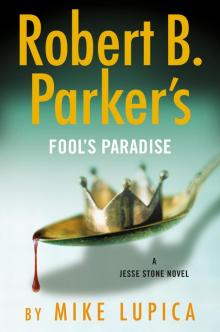 Fool's Paradise
Fool's Paradise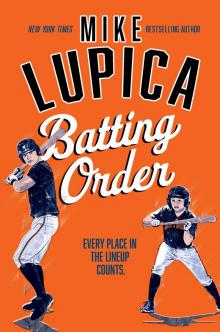 Batting Order
Batting Order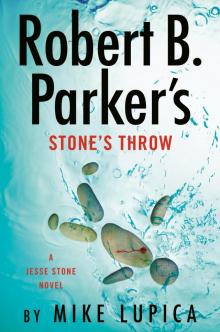 Stone's Throw
Stone's Throw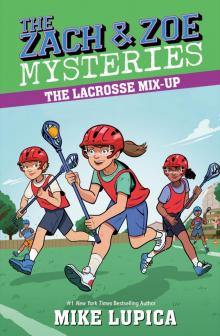 The Lacrosse Mix-Up
The Lacrosse Mix-Up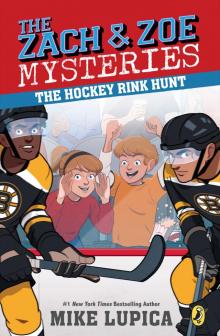 The Hockey Rink Hunt
The Hockey Rink Hunt Payback
Payback Triple Threat
Triple Threat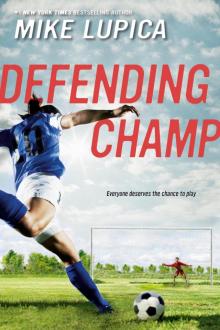 Defending Champ
Defending Champ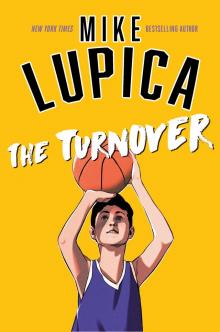 The Turnover
The Turnover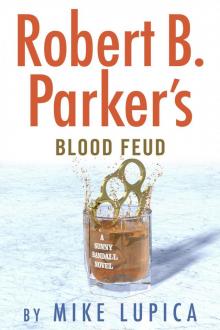 Robert B. Parker's Blood Feud
Robert B. Parker's Blood Feud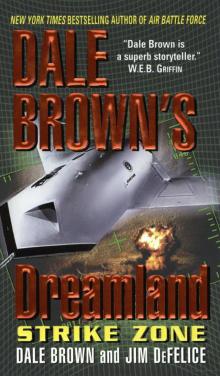 Strike Zone
Strike Zone Hero
Hero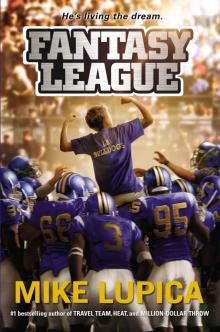 Fantasy League
Fantasy League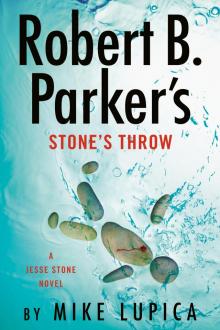 Robert B. Parker's Stone's Throw
Robert B. Parker's Stone's Throw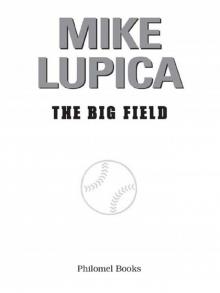 The Big Field
The Big Field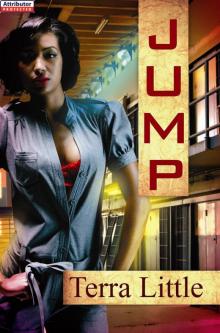 Jump
Jump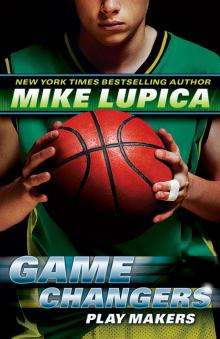 Play Makers
Play Makers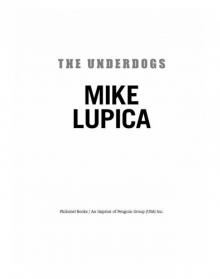 The Underdogs
The Underdogs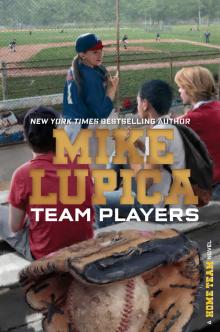 Team Players
Team Players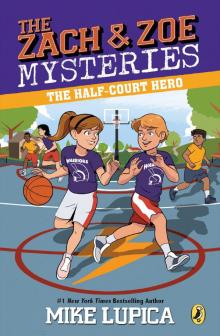 The Half-Court Hero
The Half-Court Hero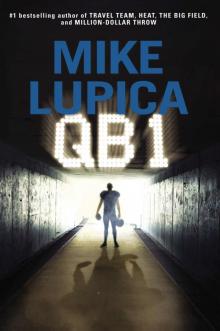 QB 1
QB 1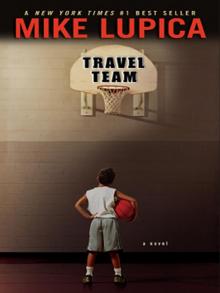 Travel Team
Travel Team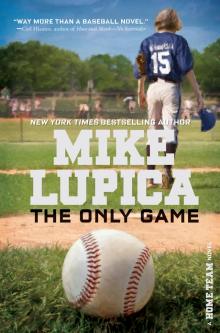 The Only Game
The Only Game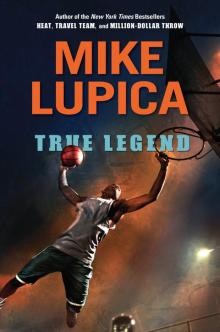 True Legend
True Legend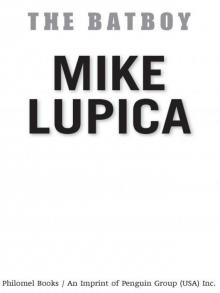 The Batboy
The Batboy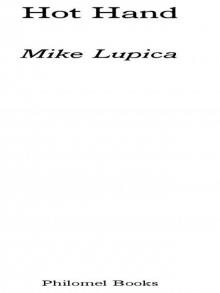 Hot Hand
Hot Hand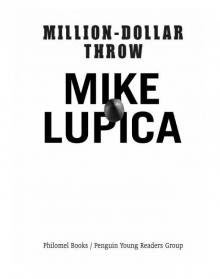 Million-Dollar Throw
Million-Dollar Throw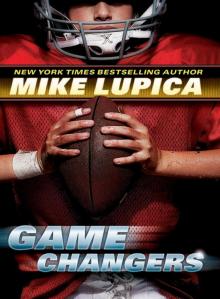 Game Changers
Game Changers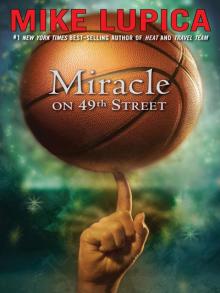 Miracle on 49th Street
Miracle on 49th Street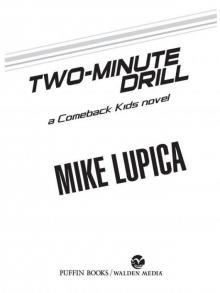 Two-Minute Drill
Two-Minute Drill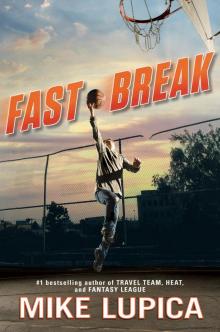 Fast Break
Fast Break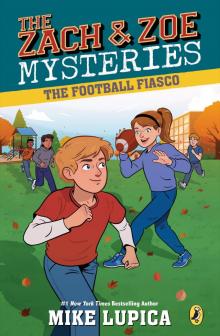 The Football Fiasco
The Football Fiasco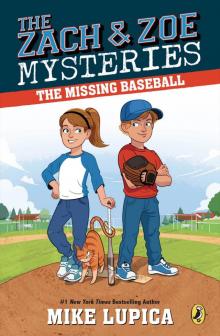 The Missing Baseball
The Missing Baseball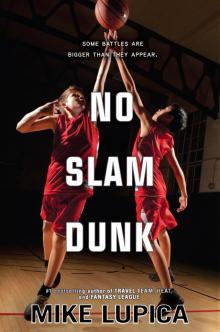 No Slam Dunk
No Slam Dunk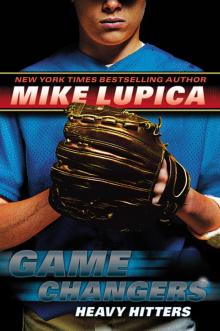 Heavy Hitters
Heavy Hitters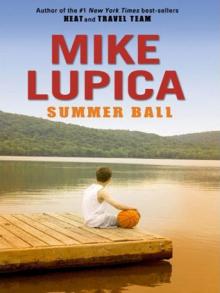 Summer Ball
Summer Ball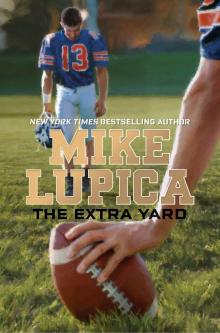 The Extra Yard
The Extra Yard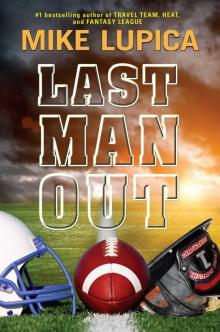 Last Man Out
Last Man Out